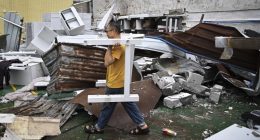War is the domain of tragedy and chance, not of reassuring patriotic stories – as my Red Army grandfather well understood
I remember, as a 17-year-old taking an A-level in history, coming home from school and one of my mums asking what I had learned that day. She knew we were studying the Soviet Union, and it was a subject she felt close to: her parents were Polish-Jewish refugees who’d found safety in the USSR after fleeing east in 1939. Her father was in the Red Army from 1939 to the end of the war. When I replied that I’d learned how many people Stalin had killed, estimated at 6 million or more, my mum bristled: “Is that really all they teach you?”
At the time, my mum’s prickly response surprised me. Stalin’s death toll seemed too big to carry any caveats. The sheer enormity of the number – which included many Jews – eclipsed any curiosity for marginal histories or rival experiences, however close to home. But our exchange stayed with me, and over time crystallised into a lesson that every history syllabus struggles to convey: sweeping narratives of heroes and villains, victors and vanquished, good democracies and evil dictatorships, cannot capture the contradictions of how life is lived on the ground.




